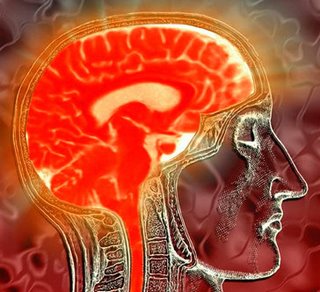
One of the more controversial side-effects of chemotherapy is something called "chemo brain" – experiences of mild confusion, mental fuzziness or loss of memory that occur both during and after chemotherapy. Many doctors deny that chemo brain exists, as a discrete side-effect – seeing it as simply another aspect of the stress, fatigue and general emotional strain that are part of living with cancer. Many chemotherapy veterans, though, aren't so sure.
I can picture several members of the support group at the Cancer Concern Center discussing the subject, at one of the weekly meetings. "Oh, yes," they were saying, nodding their heads vigorously. "Chemo brain is real."
I also have a memory of asking Dr. Lerner about it, as he was briefing me on what side effects to expect, as I began treatment. His reply was that, yes, he'd heard patients use the term, but he hadn't seen anything yet to suggest there's a physical explanation for it. He sounded skeptical, although he didn't categorically rule it out.
 Now, there's a new study that suggests that chemo brain is a real phenomenon, that may continue for as long as ten years after treatment. To quote from a Yahoo! News story of October 5, "Chemo Has Long-Term Impact on Brain Function" (based on a Reuters press release):
Now, there's a new study that suggests that chemo brain is a real phenomenon, that may continue for as long as ten years after treatment. To quote from a Yahoo! News story of October 5, "Chemo Has Long-Term Impact on Brain Function" (based on a Reuters press release):"The researchers, from the University of California, Los Angeles, found that women who had undergone chemotherapy five to 10 years earlier had lower metabolism in a key region of the frontal cortex.
Women treated with chemotherapy also showed a spike in blood flow to the frontal cortex and cerebellum while performing memory tests, indicating a rapid jump in activity level, the researchers said in a statement about their study.
‘The same area of the frontal lobe that showed lower resting metabolism displayed a substantial leap in activity when the patients were performing the memory exercise,' said Daniel Silverman, the UCLA associate professor who led the study.
‘In effect, these women's brains were working harder than the control subjects' to recall the same information,' he said in a statement."
The study appears to be of a relatively small group, whom researchers asked to perform simple memory tests while undergoing PET scans. Published in the online edition of Breast Cancer Research and Treatment, it focused on just "21 women who had surgery to remove breast tumors, 16 of whom had received chemotherapy and five who had not." The article doesn't mention whether researchers were focusing on certain chemotherapy medicines only, or whether they were generalizing to consider all chemotherapy.
Still, their findings are suggestive – although I imagine that further studies, with much larger numbers of subjects, will be needed to satisfy all skeptics.
For now, the present state of affairs will probably continue, with many doctors expressing doubts, while a significant number of patients provide anecdotal evidence that – from their point of view, anyway – chemo brain is real.
 As for me, I can't say for certain that I've experienced it. Sure, in the days following each chemo treatment, I found it hard to read for any length of time, or to concentrate on complicated tasks. But I could simply attribute that to the fact that I was feeling lousy. I could have said much the same thing about times in the pasts when I've had the flu.
As for me, I can't say for certain that I've experienced it. Sure, in the days following each chemo treatment, I found it hard to read for any length of time, or to concentrate on complicated tasks. But I could simply attribute that to the fact that I was feeling lousy. I could have said much the same thing about times in the pasts when I've had the flu.As for any long-term effects of chemotherapy on memory, I can't say I've noticed any of those, either. Sure, I find it hard to recall someone's name, on occasion – and there have been times when I've wondered whether that's a result of chemo brain – but I can't say for sure that's the cause. I'm going to turn 50 in a couple of weeks. You can't expect to get that far in life without the mental machinery casting off a few nuts and bolts.
Those of us dealing with cancer need to pay close attention to confirmed medical findings from research studies, but it also pays to listen to the anecdotal experience of others. That two-pronged approach to information-gathering is, I think, the best way.